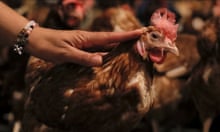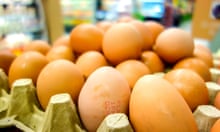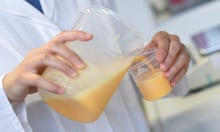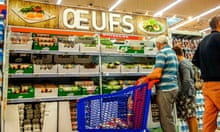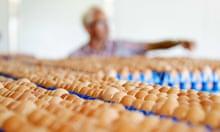Four supermarkets have withdrawn products from their shelves as it emerged that 700,000 eggs from Dutch farms implicated in a contamination scare had been distributed to Britain.
The Food Standards Agency said the number of contaminated eggs estimated to have reached the UK was far higher than the 21,000 first supposed, and that egg salads from Sainsbury’s, Morrisons and Asda, sandwiches from Morrisons, and sandwich fillers from Waitrose had been withdrawn.
Quick GuideWhat you need to know about the fipronil eggs scare
Show
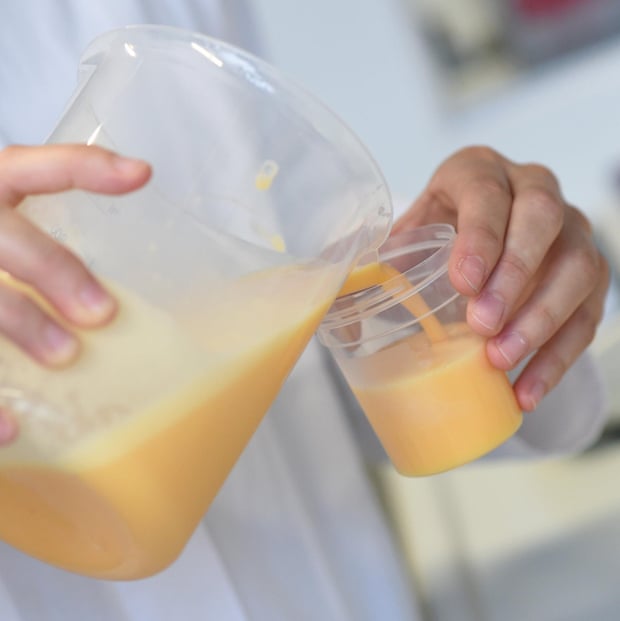
What is fipronil?
Fipronil is a toxic insecticide. It is a common ingredient in veterinary products for getting rid of fleas, lice and ticks but is banned from being used to treat animals destined for human consumption.
What risks does it pose?
When consumed in large quantities it is considered “moderately hazardous”, according to the World Health Organiszation. It can be dangerous to the kidneys, liver and thyroid glands. But the Food Standards Agency says the risks are low and the decision to withdraw affected products is based on the fact that fipronil is not being authorised for use in food-producing animals, rather than safety concerns.
Are the risks higher for children?
The German Federal Institute for Risk Assessment (BfR) calculates that an adult weighing 65kg (143lb) would be able to eat up to seven eggs within 24 hours and still be within the safe range. Because of their lower body weight, the safety threshold for children is much lower – 1.7 eggs within 24 hours for a child weighing 16.15kg (35.6lb), according to the BfR. However, as the contaminated eggs are in products such as salads and sandwich fillers, rather than raw eggs in shells being sold whole, the chances of consuming a dangerous quantity are still low.
The FSA added that it still believed from its investigations into the fipronil contamination incident in Europe that it was very unlikely that the eggs posed a risk to public health.
Some of the products will have had a short shelf life and will already have been consumed, but some were still within the expiry date and were being withdrawn by the businesses involved.
The FSA said in a statement: “The decision to withdraw these products is not due to food safety concerns, but is based on the fact that fipronil is not authorised for use in food producing animals. The Food Standards Agency and Food Standards Scotland are committed to ensuring that food is safe, and that UK consumers have food they can trust.
“We are reminding food businesses of their legal responsibilities which include informing the FSA or FSS and relevant local authorities immediately if they have any reason to believe that a food which they have imported, produced, processed or distributed does not comply with food safety requirements.”
Affected retailers have been quick to point out that all of their raw eggs in shells are sourced from Britain and unaffected by the contamination scare. However, a senior representative for the British egg industry said that UK supermarkets were “operating to double standards” by using cheaper, foreign-sourced eggs for processed products.
“This is just the latest of a number of food safety issues connected to eggs produced outside of the UK in recent years,” said Ian Jones, chairman of British Lion egg processors. “Consumers clearly want retailers and food manufacturers to use good quality British ingredients that are produced to high standards of food safety, but in some prepared foods this is not the case.
“As we approach Brexit, shoppers are growing increasingly concerned about the ingredients used in manufactured food and now more than ever want and deserve transparency on food packaging. The egg industry believes that this is a great opportunity for retailers to listen to the concerns of their customers and reassure them by specifying the use of British eggs and using the ‘Made with British Lion eggs’ logo on packs.”
The British egg industry produces enough for the country to be entirely self-sufficient in eggs, according to Prof Chris Elliott, the director of the Institute for Global Food Security at Queen’s University Belfast.
A Sainsbury’s spokesperson said: “The safety of our products is our priority. Our supplier has made us aware that two salad bowls, which contain egg, may include very small traces of fipronil. The FSA has advised that this is unlikely to pose a health risk, but we’re withdrawing these products from sale on a temporary basis as a precautionary measure. We’re sorry for any inconvenience this may cause.”
A Waitrose spokesperson said the supermarket sometimes used imported eggs when there were insufficient British free-range eggs available on the market to use as an ingredient in own-brand products.
“Three of our sandwich fillers have been withdrawn from sale as a precaution,” the spokesperson said. “Our own assessments based on industry-wide scientific standards have shown that these products do not pose any risk to health.”
A spokesman for Morrisons said: “We are working closely with the FSA on their fipronil investigation and we have taken precautionary and prompt action to withdraw the three products that may be affected. The safety of our customers remains our priority.”
The contamination scare became public on 1 August when it was revealed that tests had established that fipronil, which is banned across the EU from use in the production of foodstuffs, had found its way into the food chain.
Exposure to fipronil can cause nausea, vomiting, headaches and dizziness. Long-term exposure to large quantities can cause thyroid, liver and kidney damage, and can even lead to seizures.
Authorities in the Netherlands ordered eggs to be pulled from supermarket shelves and temporarily closed down about 180 farms. Millions of eggs were subsequently removed from sale in Belgium and Germany.
The European commission said on Monday that British food safety authorities had been alerted over the weekend that eggs imported from Germany could be dangerous. Officials in France, Sweden and Switzerland were also informed of a risk to consumers.
Dutch investigators said on Thursday they had arrested two managers at the company that allegedly used fipronil at poultry farms. The arrests came after coordinated raids with Belgian authorities at eight locations across the Netherlands with the assistance of the EU’s Europol and Eurojust agencies.
“The Dutch investigation focused on the Dutch company that allegedly used fipronil, a Belgian supplier as well as a Dutch company that colluded with the Belgian supplier,” prosecutors said.
“They are suspected of putting public health in danger by supplying and using fipronil in pens containing egg-laying chickens.” Dutch media named the suspects’ company as ChickFriend.
Belgian prosectors in Antwerp said they had launched raids at several companies potentially implicated in the illegal use of fipronil.
A spokesman, who declined to offer any further details, said: “Several searches are currently under way.”
The two companies focused upon until now have been the Dutch firm ChickFriend, which specialises in the disinfection of poultry farms, and its Belgian supplier Poultry-Vision.
A European commission spokesman, Daniel Rosario, called on member states to put their differences aside over the issue. Belgium accused the Netherlands on Wednesday of failing to sound the alarm on discovering in November that fipronil was being used illegally in the keeping of chickens.
“Now it is the moment to act in a decisive, coordinated and transparent manner, not to be engaging in any kind of blame game,” Rosario said, adding that the commission expected EU leaders to discuss how to learn lessons from the scandal at the next meeting of the European council.
Heather Hancock, the FSA’s chair, said: “I’m confident that acting quickly is the right thing to do. The number of eggs involved is small in proportion to the number of eggs we eat, and it is very unlikely that there is a risk to public health.
“Based on the available evidence there is no need for people to change the way they consume or cook eggs. However, fipronil is not legally allowed for use near food-producing animals and it shouldn’t be there.”
The FSA had originally said British food safety inspectors were trying to trace 21,000 eggs imported from affected farms in the Netherlands between March and June.
The German Federal Institute for Risk Assessment (BfR) says the highest amount of fipronil measured was 1.2mg per kg of egg. It calculates that an adult weighing 65kg (143lb) would be able to eat up to seven eggs within 24 hours and still be within the safe range.
A child weighing 16.15kg (35.6lb) should not eat more than 1.7 contaminated eggs within 24 hours, it said. Which egg products have been withdrawn?
The FSA’s list of products, with pack size and use-by dates:
- By Sainsbury’s ham and egg salad – 240g – 9-14 August.
- By Sainsbury’s potato and egg salad – 300g – 9-14 August.
- Morrison’s potato and egg salad – 250g – 13 August.
- Morrisons egg and cress sandwich – sold in Morrisons Cafe only – 11 August.
- Morrisons Cafe sandwich selection – sold in Morrisons Cafe only – 11 August.
- Waitrose free-range egg mayonnaise deli filler – 240g – 13-16 August.
- Waitrose free-range reduced fat egg mayonnaise deli filler – 170g – 14 August.
- Waitrose free-range egg and bacon deli filler – 170g – 14-16 August.
- Asda Baby potato and free-range egg salad – 270g – 9-14 August.
- Asda spinach and free-range egg snack pot – 110g – 9-13 August.
- Asda FTG ham and cheddar ploughman’s salad bowl – 320g – 9-13 August.

